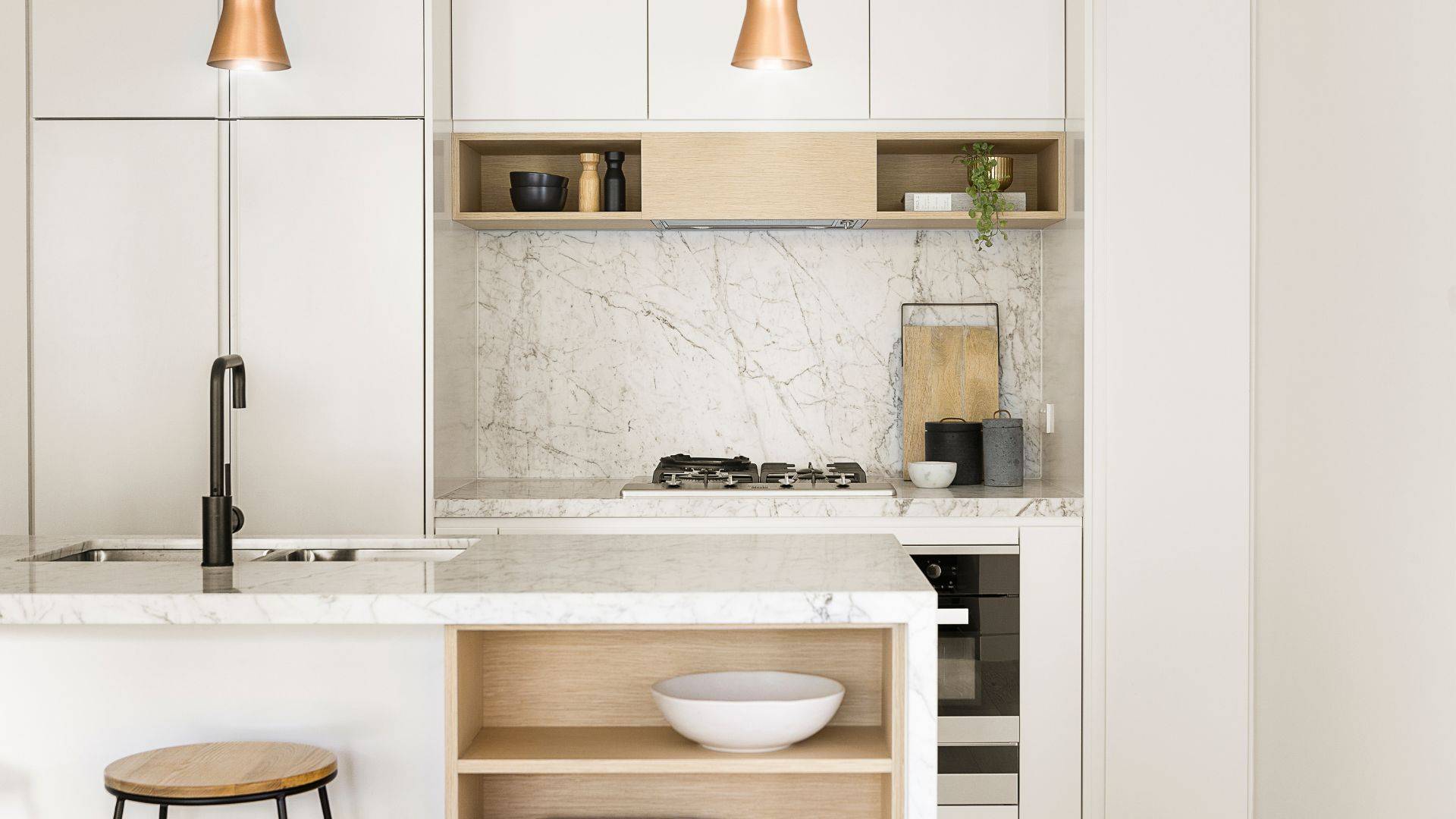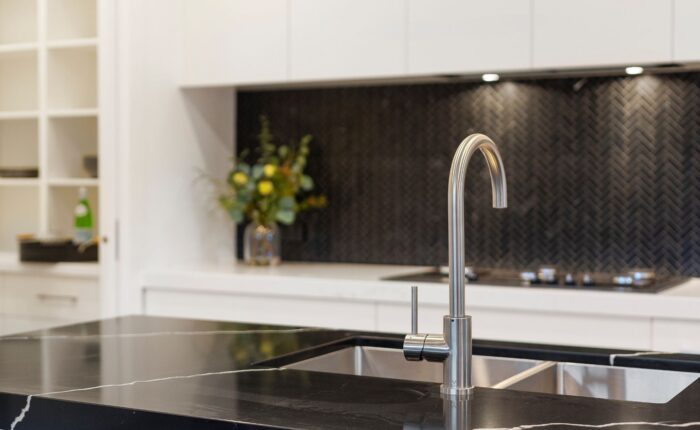Every homeowner knows that selecting a worktop material is a crucial step in any kitchen or bathroom remodelling process. While prioritising visually stunning materials is essential, it’s equally vital to consider factors such as durability, maintenance, and protection against scratches and heat. That is why most homeowners often find themselves torn between quartz vs porcelain.
With a combination of visual elegance and durability, both quartz and porcelain worktops provide exceptional options for your kitchen or bathroom. In this article, we explain the significant differences and similarities between these two materials, with the aim that, by the end, you can confidently decide on the best choice for your space!
Elegance that Lasts: Why Quartz Is a Prime Worktop Choice
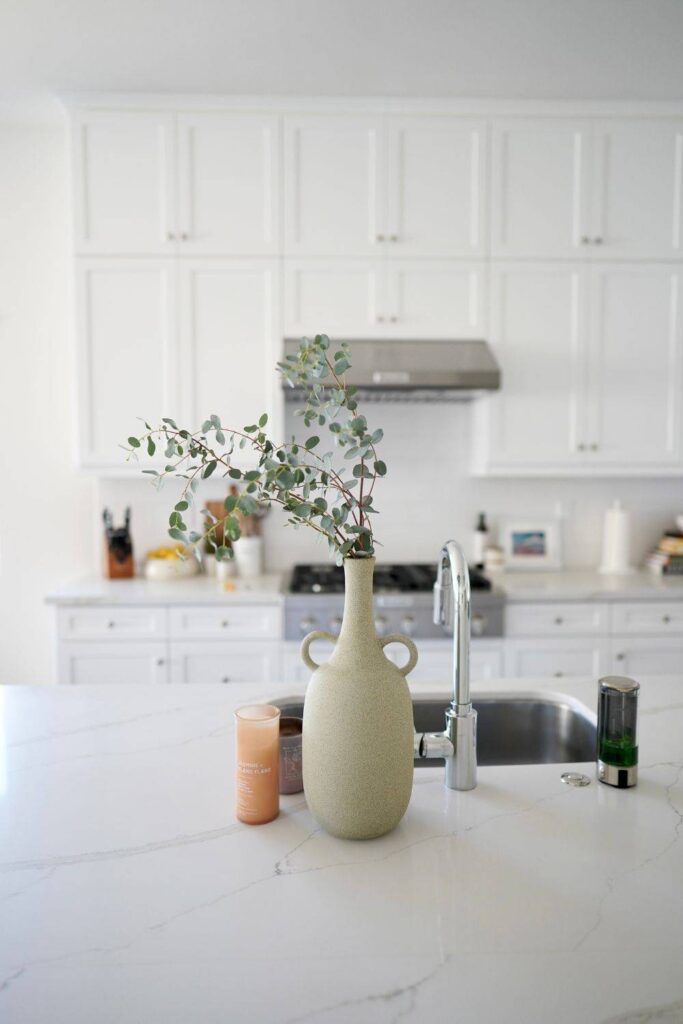
Due to its endurance and sophisticated appearance, quartz has remained a top pick among homeowners for decades. And rightfully so. It is non-porous, which makes it a hygienic material for a kitchen or bathroom surface. It is also very enduring in terms of damage and, notably, showcases timeless elegance which will make your space look elegant and refined.
Benefits of Quartz
1. Non-porous
When considering kitchen or bathroom worktops, it’s always smarter to opt for materials that are non-porous. This means that they do not let bacteria and other microorganisms under the surface, thereby ensuring that they are hygienic and stain-resistant.
So, if your coffee or wine decides to take a little tumble, no need to stress – your quartz worktop can easily be cleaned. However, be careful with lemon juice or vinegar, since quartz can be sensitive to prolonged exposure to acidic substances.
2. Durable
There is a reason why quartz has been the long-standing champion of worktop materials, and it’s due to the fact that it is exceptionally durable. If you decide to install quartz worktops in your home, you can rest assured that you have chosen a very reliable and enduring material.
If you somehow manage to create a light scratch on your worktop, don’t panic, because scratches on quartz can easily be buffed out with polish. Quartz worktops have one weakness, though, and it is heat. Therefore, be cautious about placing hot pans on your countertop while cooking.
3. Variety of Colours
Since it is an engineered material, quartz comes in a variety of colours and patterns, which offer more flexibility than choosing a natural material like marble.
While you can still mimic the appearance of marble with quartz worktops, quartz also comes in solid colours of different shades, whether you want a subtle shade or an eye-catching slob. Therefore, you have the option to choose between various shades, allowing you to consider the one that best compliments your interior.
4. Easy to Maintain
Good news for busy homeowners – quartz worktops are very easy to clean. For daily maintenance, simply use a wet cloth, or in case of more stubborn stains, a mild dish soap or detergent. Moreover, in contrast to granite and other natural stones, quartz doesn’t need sealing, adding another advantage to its low-maintenance profile.
The Rising Trend of Porcelain Worktops
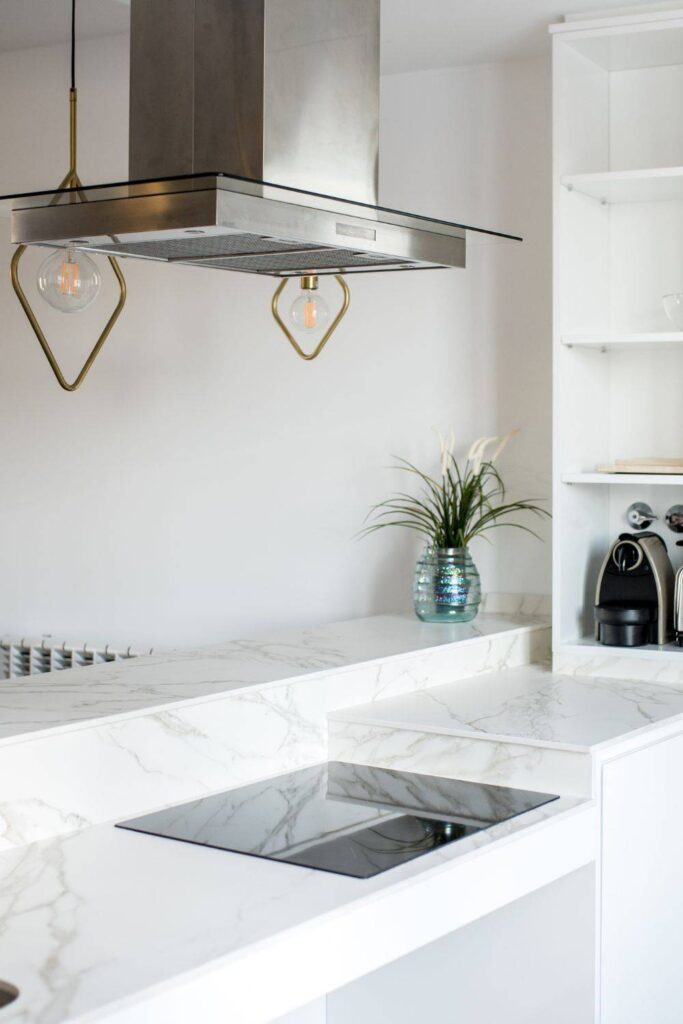
The popularity of porcelain worktops has been steadily increasing in recent years, becoming a favoured choice among homeowners. Manufactured from a type of clay commonly called China clay, porcelain worktops are also eco-friendly: their production embraces sustainability, often featuring recycled materials in a delightful nod to the planet.
Benefits of Porcelain
1. Non-porous
Just like quartz, porcelain is a wise choice for a worktop due to its non-porous surface. In simpler words, it does not let bacteria penetrate the surface and it is stain-resistant, making it a good choice for spaces that need frequent cleaning, like kitchens and bathrooms.
2. Variety of Colours
Porcelain worktops come in a wide variety of colours and patterns, offering a sleek and elegant design to suit your taste. Also, porcelain slabs come in large sizes (up to 10’ x 5’), which means that you can easily cover a kitchen island with one porcelain slab, which means fewer seams and easier installation.
3. Durability
If you decide to go with porcelain worktops, rest assured that they are going to be there a long time. The material is outstandingly durable and heat-resistant, making it a safe choice for a kitchen countertop for hot pots and pans. While it is described as a scratch-resistant material, it should be mentioned that porcelain can easily get damaged by ceramic knives.
4. Easy to Clean
Another great advantage of this rising star is the easy maintenance. It is enough to just use a washcloth with water and gentle cleaners. Also, another great thing about porcelain is that it doesn’t have to be sealed like other natural materials.
Quartz vs Porcelain: The Showdown
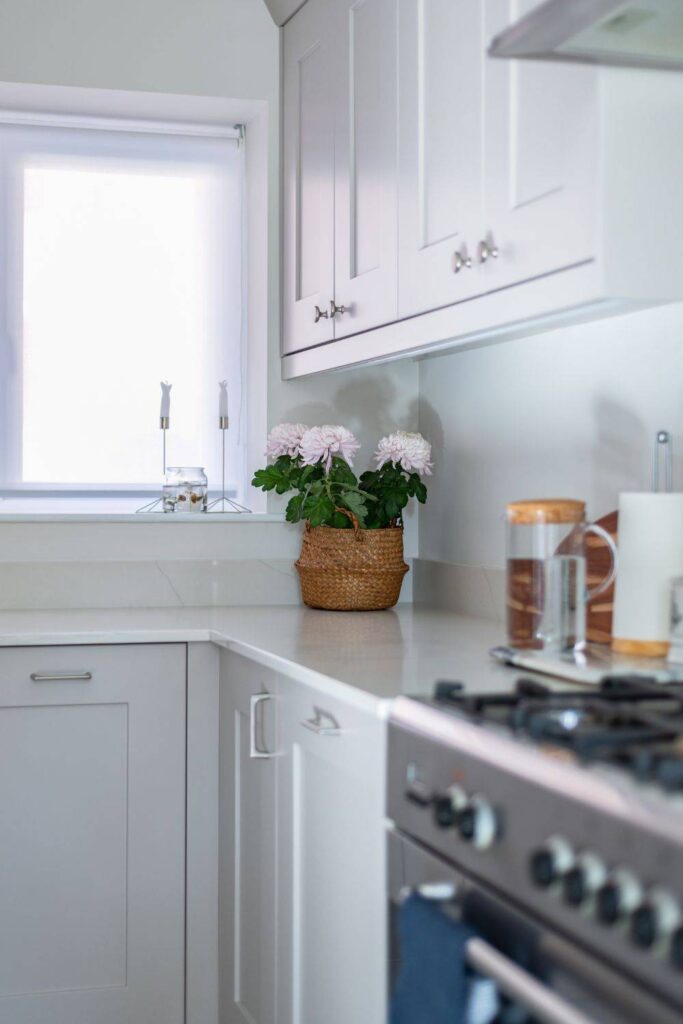
Now that we’ve established what each material brings to the table, it is time for a detailed comparison. While both quartz and porcelain share similarities as manufactured materials, there are some nuances that you should keep in mind.
Quartz vs Porcelain: Appearance
If versatility of colours and designs is an important factor for your kitchen renovation, then you can opt for either of these materials.
Both materials undergo a manufacturing process that allows for the blending of various pigments, providing you with the flexibility to select the perfect design and colour scheme for your space. This versatility ensures that your kitchen can be tailored to match your aesthetic preferences seamlessly.
In terms of finishes, popular quartz finishes include polished, honed, and textured options, offering a range of sleek or matte surfaces. Porcelain, on the other hand, commonly comes in polished and matte finishes, allowing for diverse aesthetic choices in your kitchen renovation.
Quartz vs Porcelain: Durability and Porosity
A high-quality stone worktop should not only be visually appealing but also resilient enough to withstand the demands of daily activities, from cooking to various tasks.
In terms of heat resistance, porcelain shines as a superior choice due to its manufacturing process involving high temperatures. This quality makes it particularly suitable for both kitchen and bathroom tops. In contrast, quartz, while durable, may exhibit discoloration when exposed to prolonged heat.
When it comes to scratch resistance, quartz proves to be a wiser choice, making it suitable not only for kitchen countertops but also for bathroom surfaces. While porcelain can withstand a certain amount of scratching, it may be more sensitive, especially when it comes to the use of ceramic knives.
Quartz vs Porcelain: Cleaning and Maintenance
Maintaining the cleanliness and appearance of your worktops is essential, and both quartz and porcelain make this task remarkably easy. Unlike natural materials such as marble, neither of these options requires constant resealing, simplifying your cleaning routine.
Opting for either quartz or porcelain will alleviate much of the maintenance burden associated with other materials. Notably, porcelain holds a slight advantage in this regard, as it is not sensitive to acidic substances like quartz.
Quartz vs Porcelain: Which One is Cheaper?
The pricing dynamics of quartz and porcelain depend on several factors, such as quality, design intricacy, and the dimensions of the materials.
Quartz, often considered as a premium alternative to granite, typically commands a higher price due to its durability, luxurious appearance, and versatile design options.
In contrast, porcelain worktops offer a more budget-friendly alternative, making them an attractive choice for those seeking cost-effective solutions without compromising on aesthetic variety.
Quartz vs Porcelain: The Winner
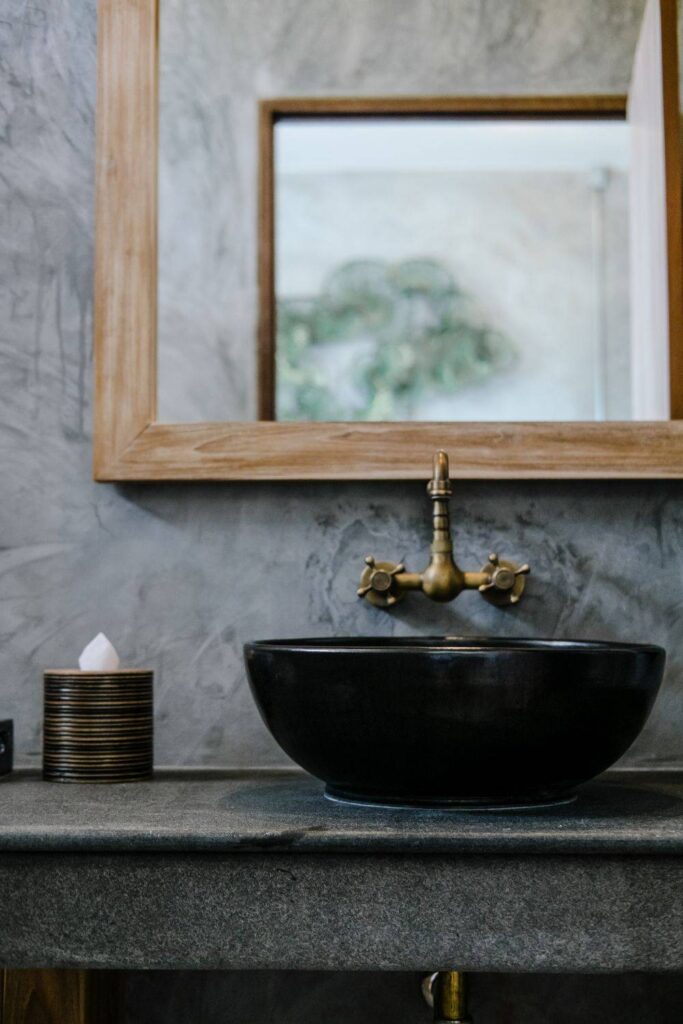
Determining a clear winner between quartz and porcelain is challenging. Both materials offer luxurious aesthetic and easy maintenance, making them a great alternative to natural stone.
To make an informed decision, weigh factors that are personally important to you, such as budget and your daily needs.
Finally, it’s essential to seek expert advice, and we encourage you to reach out to us for guidance and a personalised quotation.
info@bucksmarble.com
01494 793515

